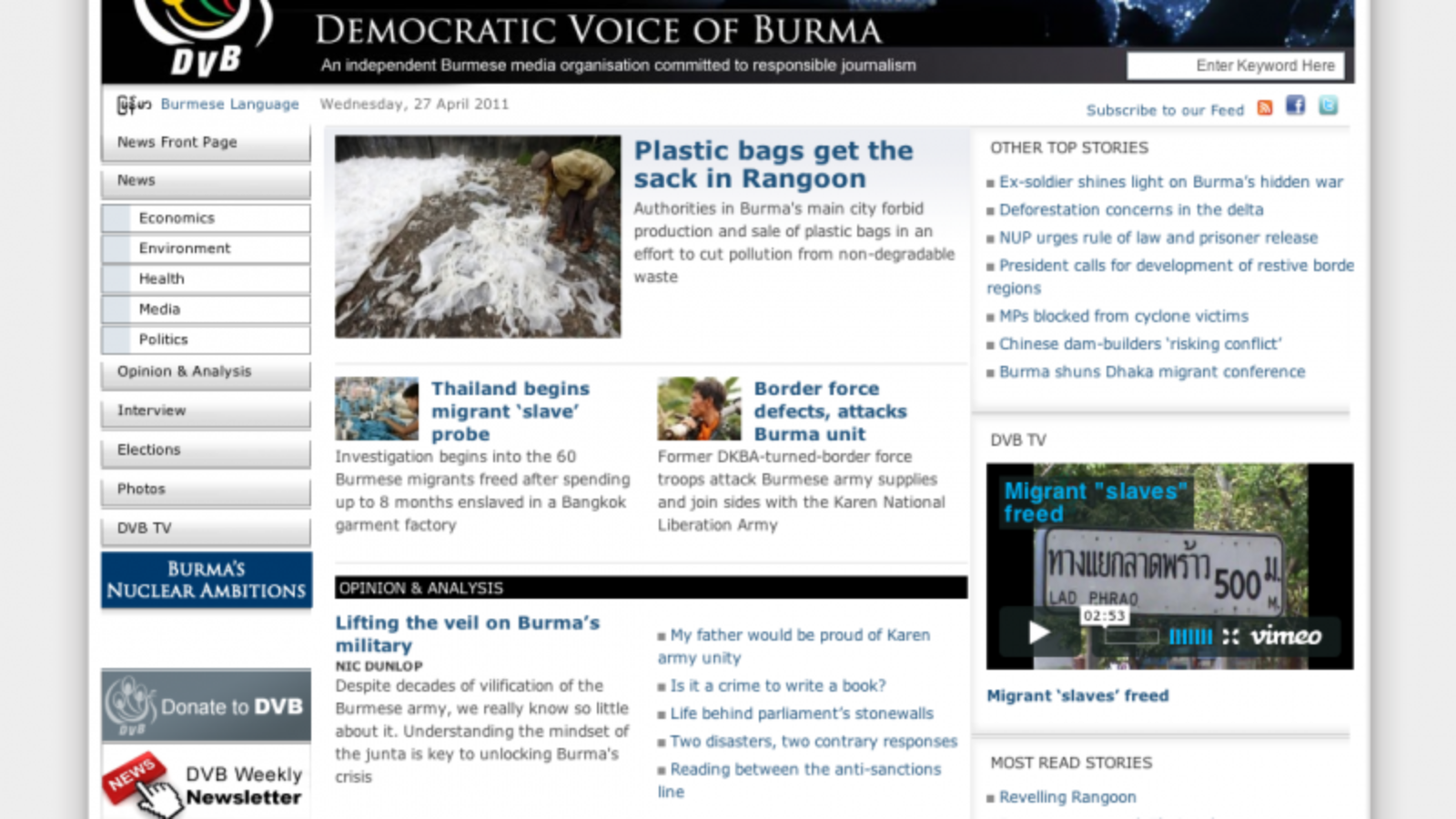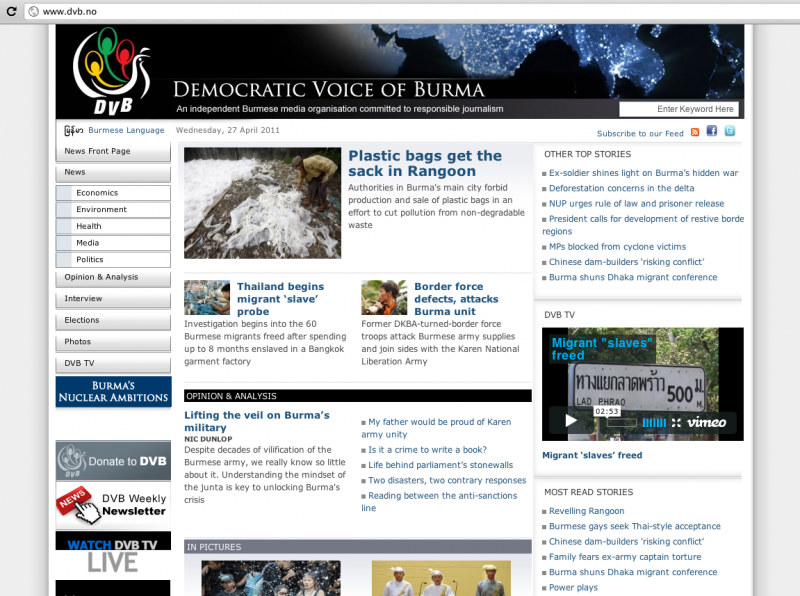This article is part of the Digital Freedom and Control Project produced exclusively for the World Policy Journal by students from the Columbia University Graduate School of Journalism.
By Joe Danielewicz
In a country known for some of the tightest media controls in the world, exiled Burmese news organizations work to provide accurate information. They do so via the Internet, which serves as an information bridge between events inside Burma and the rest of the world.
“They play a hugely important role in what is called the ‘Burma news cycle,’” according to Jeff Hodson, a former Knight International Press Fellow and media trainer for expatriate groups in the region.
“Information that can’t be published inside the country because it is too sensitive is often collected or sent to exile media outlets,” Hodson said. That information is then published online, broadcasted or delivered back to Burma through various methods.
“They’re very key in getting the information out,” said Lisa Brooten, a professor at Southern Illinois University Carbondale who studies Burmese opposition media.
Since the current military junta took control of the country in 1988, it has exercised tight control over the media.
Brooten says the founders of the more commonly known news organizations were originally part of the student movement that first fought against the current regime when it came to power.
Today, there are approximately 13 established exile media organizations. Brooten divides the outlets into two categories: ethnic focused media (approximately ten groups); and three more established exile media groups, known as the “big three”: The Irrawaddy, Mizzima and Democratic Voices of Burma (DVB).
Based in nearby Thailand, India and Norway, respectively, the three organizations were successful in reporting on the 2007 “Saffron Revolution,” a series of protests that were sparked by a rise in gasoline prices in Burma. They used undercover reporters, stringers and citizen journalists to report news from inside Burma to the rest of the world. Text messages from inside the country, still pictures and video were transmitted to the news organizations. Contributors used proxies to bypass the government’s Internet restrictions.
In the process, the exiled editors and reporters became the experts on Burma for an international audience, and the brand of the “big three” news organizations gained greater recognition.
It’s hard to quantify the effect exile media groups are having within Burma, but there are some visible signs. The government doesn’t acknowledge the news outlets, but Sein Win, the managing editor for Mizzima, says he’s seen examples of stories being reported by exile media and the government issuing a response to the news within an hour.
Mizimma, based in India, plans to run a special investigation project, monitoring corruption within every government ministry, using local sources and reporters.
Exile news organizations have developed and adapted to new technologies, with the Internet being a major game changer. Readers in Burma are able to instantly access news from the exiled news groups despite heavy restrictions by the government. Instead of printing and distributing newspapers or pamphlets, readers can use proxies and peer-to-peer networking to read and share the publications.
With the Internet, “more people are willing to talk about politics and engage,” Sin said. He believes approximately 35 percent of the 30,000 visitors each day to the Burmese-language version of Mizzima come from inside the country. Social networking sites such as Facebook also increase the impact of the news organization, as users re-post reports from the news site. Sin also believes online readers print out particular articles and pass out to others, increasing the exile media’s reach. There are an estimated 60,000 – 80,000 Facebook users, according to Sin, though outside estimates are inconclusive.
News reports from exile groups also find their way and to a larger audience outside Burma. That news is often picked up by international news providers, such as the Voice of America and the BBC’s Burmese service, Radio Free Asia and CNN.
Brooten believes this wider reporting circle “keeps international pressure at a certain level.” She said it also “keeps the generals on their toes, to make at least some kind of lip service to democratic reform.”
Many of the exiled media groups produce the news by undercover reporting. Mizzima News stated the service had nearly 100 people in the country to cover the 2010 election. Like all newsrooms, the budget determines how resources are allocated. A newsroom manager expects half as many people to contribute reports this year from the country because of a decrease in funding. Funding comes from different sources, including the National Endowment for Democracy, the Open Society Institute and the International Media Support group.
The dangers to these reporters and stringers are real. The Committee to Protect Journalists said in its 2010 census of imprisoned reporters that Burma held 13 journalists, the fourth highest in the world, and had arrested three reporters for DVB who were working in the country and an unknown number of undercover reporters from other exile media organizations.
Brooten says many reporters use “cloak and dagger” operations, with great attention to security. Some groups operate as underground reporting cells, so if one member is interrogated, the identities of those in other groups are protected.
Some stringers are in government positions and have good access to information, while others are journalists working for government controlled media who moonlight for the exiled media groups. Mizimma’s Sin says information from the reporters inside Berman is double-sourced before publication.
The government has tried to strike back. The Burmese government is suspected of conducting distributed denial of service (DDoS) attacks against Irrawaddy, Mizzima and DVB in September 2010. A DDOS attack is when someone hijacks other computers for the purpose of shutting down the target computer by sending bad data or requesting services information, with the intention of causing the website to become inaccessible. Similar tactics were used by the government in 2008 against the exiled media websites.
The Irrawaddy website recently experienced a hacking attack that may have compromised names of undercover reporters, according to reports from the Committee to Protect Journalists.
Internet penetration is very low in Burma. Since the first official email service began in 1997, the government has maintained tight control over the technology. The number of Internet users is estimated at 110,000, by the International Telecommunications Union. An estimated 15,000 people are connected at broadband speeds. Burma’s population is nearly 54 million people.
Private Internet access is prohibitively difficult because of cost and government control. Reports on pricing vary, but home Internet service cost up to $45 – $130 per month according to Freedom House. Proof of police clearance is also required to receive a private Internet connection.
Because of the cost, many users surf online in Internet cafes in cities. Though the cybercafés are open to the public, owners are required to maintain usage records for the police to inspect upon request. After a series of bombings in public spaces and cybercafés in November 2010, the government ordered owners to install CCTV cameras and hire staff to monitor users’ behavior to stop other attacks.
Popular websites such as Gmail, Facebook and Twitter are sporadically blocked by the junta, according to a 2011 Freedom House report. A list of barred URLs and domain names is updated by the government weekly. The government routinely regulates bandwidth during politically sensitive times.
As a way to broaden their reach and counter cyber attacks, exiled media have adopted different delivery strategies. DVB has a history of operating a TV broadcasting and online video service. Mizimma also offers online videos on a dedicated website. But the government is able to slow down data and restrict the ability to stream video because it controls the Internet infrastructure.
In previous years, news videos were smuggled into the country via VHS tapes. Now technology allows for video to be moved via CDs, DVDs and thumbdrives. Several groups already provide video reports with this method. Mizimma will start a pilot program of couriered video reports later this summer via CD and DVD.
“The Burmese people are more informed now. And Burmese officials have improved,” Mizzima’s managing editor Sin said about the achievements of the exile groups. He believes the organization has grown professionally over the years into a serious news operation.
“They’re trained to be objective, but they are all promoting change in a country they don’t like,” Burton said. “They recognize you can be credible and still have the goal of changing government.”
While acknowledging the Internet has changed the environment in which the groups operate and increased their reporting punch, she is cautious.
“It helps to weave together already existing groups and technologies… and expands the loop of other information,” she said. “ [But] the Internet is only as powerful as the already existing networks on the ground.”
*****
Joe Danielewicz is a freelance multimedia producer based in Washington D.C. He's a recent graduate from the Columbia University Graduate School of Journalism.
Digital Freedom and Control
Russia and Asia
Latin America
Middle East

